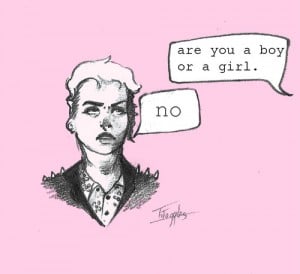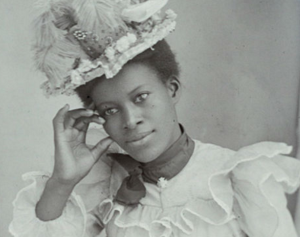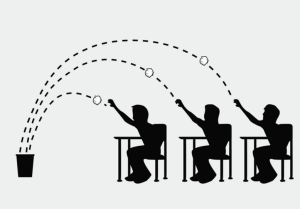
Source: Huffington Post
I’m feeling kind of negative about body positivity.
Not in theory. In theory, body positivity is a good thing.
In practice, however, it feels a bit like Soviet communism in the 30s: for the good of the people until a bunch of assholes come in, screw it up, and turn it into a fascist dictatorship.
Because, let’s face it: In the age of media saturation and social media addiction, our bodies are being dictated — over and over and over again.
The 24-hour news cycle and the pervasiveness of photo manipulation have turned us all into a bunch of bickering body shamers — including those of us in the body-positive community.
And I’m not okay with that.
So, in no particular order, here’s why I’ve had it with body-positivity.
1. It Inspires ‘What Is Body-Positivity Really?’ Debates
Simply put, like any other practice based on values-laden theory:
It opens up the conversation to opinions about what body positivity “really” is. And that invites shaming from people who don’t agree on what kind of bodies we can be positive about.
The lens through which you see the world ultimately determines how you’ll define body-positivity.
And the trouble with this is that everyone has a lens through which they see the world and experience the act of embodiment.
And the trouble with that is that when your lens sees a different shade of gray than someone else’s, the potential for discord and disconnect ratchets up.
I see this happening all over the Internet as we set up “camps” around food, fitness, and body ideologies.
Black and white thoughts about “right” bodies and “right” diets stand out in sharp contrast against one another, because everyone has a stake in being a part of the accepted paradigm.
One person says that vegan marathoning is the way to go; another says Paleo crossfitting is the answer.
And when the two go head-to-head?
Well, this is the reason why you should stay out of the comments section on blogs.
Just as with fitness and nutrition, so can we get fixated on doing body positivity “right” — and, of course, because body positivity is based on opinions and generalizations and competing narratives, there’s no one way to do it right at all.
I don’t think body shaming comes from a place of hatred. It comes from a place of fear.
For example, let’s talk for a second about the body positivity movement known as “fat acceptance.” Acceptance sounds like a pretty positive thing, right?
Well, according to the Internet, in order to be fat-accepting, we have to also be skinny-shaming. (PS: To have this assumption demolished for you, read this article by Melissa A. Fabello.)
Instead of making room for fat, round, curvy, whatever bodies to be a version of “right,” we misinterpret the narrative and assume that a fat body being “right” is about thin bodies being “wrong.”
The reason?
We’re all scared to death of not being accepted by everybody, so we do everything we can to prove that we’re worth others’ acceptance — only you can’t please everybody, and everybody’s got an opinion.
For example: One person posts a fitspirational picture of a six-pack; another posts a quote attributed to Marilyn Monroe. Then the argument starts.
Instead of making room for both bodies, we worry that maybe our way is wrong if your way is right.
And if our way is threatened, then we risk being ostracized; we risk losing acceptance.
And so, in order to get rid of the threat, we shame the other person, the other person’s choices, and the other person’s body.
If they’re wrong, we’re right, the reasoning goes, although it’s false logic: Their wrongness doesn’t validate our rightness.
It’s an exclusive proposition, and we can both be equally right, equally wrong, or some gradation in between.
(Side note: One thing that makes me frustrated about the fat-shaming versus skinny-shaming conversation is that it’s not about people with naturally fat bodies versus people with naturally thin bodies. It’s usually about people who are not naturally thin trying to maintain an ideal.
They obsess about being thin/lean/fit and are scared to death about gaining any body fat, so they try to legislate against their own fears of becoming an “other” and take offense at being called on their fear and obsession. I was one of them, so I’m speaking from a place of personal truth.)
This is why it frustrates me when fitspiration co-opts body-positivity: It reinforces the “rightness” of your ideology by hiding it in what seems like a benign and benevolent message.
Like the Nike ads about “thick thighs” and “big butts,” you’re still reinforcing the “strong is the new skinny” message if you typify a body shape as “more right” than another.
So if you post a picture of a “strong” (read: ripped) woman with a “body positive” message on it, you may be subliminally shaming everyone who hasn’t achieved that same physical state — or who doesn’t want to achieve that same physical state.
(Or not subliminally; see: Maria Kang.)
On the flip side, if you were to look at something like the Special K “fight fat talk” ads, body-positivity gets co-opted to prove that there’s still a “right” body out there:
The ads show women learning to accept their size — in order to sell a brand that continuously markets low-fat, low-calorie diet foods.
The message? Good for you for accepting yourself — but if you don’t want to look like that anymore, we can show you how to change to look like us (read: our ideals).
More and more, I see people using body-positivity as a way to seek acceptance by proving their rightness, but because there is no “right” body, body-positivity fails in the face of competing expectations and ideologies every time.
2. It Sets Up Feelings of Failure
It makes us feel anxious and less-than when we can’t access that feeling of body positivity: If I have a “fat day,” have I failed?
If you buy a self-help book, and it doesn’t help you, is it you who have failed?
If you follow a meal plan to a “T,” and you still don’t look and feel like the woman pictured in the testimonial on the sales page, did you do it wrong?
If you practice self-care and still wake up “feeling fat” (which isn’t a feeling, by the way), are you a bad person?
The whole problem with the self-help industry is that it places a premium on ultimate happiness and constant positivity, as if that’s some sort of achievable end goal.
Feelings — including positivity and negativity — are not static.
Emotions ebb and flow as we experience life from moment to moment. You cannot be expected to constantly be positive just as you cannot be expected to constantly be scared, excited, or bored.
Yes, you can fake it until you make it, but that doesn’t always work. And what happens when you can’t achieve a state of joy about the size of your breasts or your nose as promised by the latest self-love article on the Huffington Post?
Anxiety. Self-doubt. Self-flagellation.
Frankly, I think it’s a little insulting that the Internet and the latest issue of your favorite women’s magazine believe you have to love your “flaws.”
Let me take some of the pressure off for you: If you don’t want to like your cellulite, you don’t have to.
Writing an emotional paean to the scar on your left knee or the stretch marks from your third child can feel cathartic, but you are not required to feel it or fake it.
That said, just because you don’t like it doesn’t mean that you can’t find reasons to love yourself. As a whole.
Not your cellulite or your thick thighs or your muscular shoulders or your laugh lines. You as a person.
You’re not a collection of parts, unless you want to get meta about things, and then I challenge you to write a love letter to every cell that makes up the being that is you — it’ll probably take you about seven years, which is great, because by then, you’ll be made up of brand new cells, and you can start all over again.
And as for your “flaws?”
Think of them like your relationship with your family: You may not always like the things they do, but they’re a part of the fabric of your life, and you usually find ways to love them anyway.
This actually leads directly into my next point:
3. It Keeps Us Body-Focused
The body-positivity movement asks us to focus on our bodies when, in reality, we should be focusing on making a change in the world or living our lives, or being positive about things that have nothing to do with our bodies.
The amount of navel-gazing we are required to do in order to love ourselves is absolutely absurd. How in the world are we expected to stop fixating on our “flaws” if all we do is fixate on them?
Example: Instead of journaling about how you feel about your weight, go take an art class and paint a landscape.
Instead of soliloquizing about how you’re wearing a bikini even though you don’t “have a bikini body,” go volunteer to clean up a local beach.
Instead of worrying about how much support you’ll get for your latest Facebook profile picture, go support a politician who is campaigning for a cause you care about.
Pick an identity beyond the one you wear on your skin.
While your exterior looks static, you’re picking up and shedding your physical molecules as you grow and go through life.
You are transitive, ethereal, and fluid, so there’s no sense in dwelling on the things we’ve falsely told ourselves are unchangeable.
Be recognized for the things you do, for the passions that drive you, and the impact you leave on your loved ones and your communities.
***
If you’re truly doing body-positivity right, your crow’s feet will tell the story of the smiles you’ve given and received, your sunspots will be reminders of wonderful summers spent celebrating outside, your stretch marks and scars will tell stories of change, growth, pain, and recovery.
And you won’t have to say a word about them because you’re too busy focusing on making new memories — not molecules.
What do you think? Is body positivity bullshit, a diversion, or a necessary evil? And how can we address this as a cultural phenomenon? I’d love to hear your thoughts!
[do_widget id=”text-101″]
Kaila Prins is a Contributing Writer for Everyday Feminism and a health coach who works with women who are ready to stop “recovering” from disordered eating and start “discovering” their true identities. Kaila’s health coaching services, as well as her blog, can be found at In My Skinny Genes, and she hosts a weekly podcast called Finding Our Hunger. She also counts characters and not calories on Twitter @performingwoman.
Search our 3000+ articles!
Read our articles about:
Our online racial justice training
Used by hundreds of universities, non-profits, and businesses.
Click to learn more



















